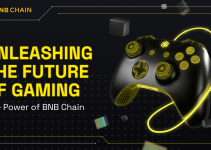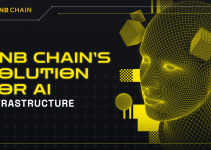Table of Contents

BNB Chain: MEV Current State
Currently, there are 3 major MEV solutions in the BNB Chain ecosystem – namely, Puissain, TxBoost and BloxRoutes. All of them are working together with validators directly to provide MEV solutions. Each of these solutions has different pricing models, and adopts their own MEV model.
| Solution | Integrated Validator Number* | Pricing Model | Follows gas price order | Sandwich Protection | MEV Model |
| Puissain | 7 | Pay high gas fee – 60 gwei | Yes | No | Flashbot |
| TxBoost | 9 | Free | No | No | MEV Boost (Modified) |
| BloxRoutes | 14 | Monthly subscription | No | No | MEV Boost (Modified) |
*One validator may connect to more than one MEV solution
Summary: Current status of MEV solutions on BNB Chain
- Significant Validator Integration: As of the latest data, a substantial portion of active validators on BNB Chain – approximately 23 out of 29 – have integrated with MEV providers. This marks a considerable uptick from just 6 at the end of 2022.
- Increased Profits and Efficiency: Many validators have reported greater profitability (improvements of between 7% and 15%) and operational efficiency due to the integration with MEV providers.
- The fragmentation of MEV (Maximal Extractable Value) solutions in BNB Chain introduces significant risks and complexities that can hinder the development of a healthy MEV market.
Challenges or Problems in Current MEV Solutions
- Complexity of MEV solutions for validators
The lack of a standardized Builder API for MEV (Maximal Extractable Value) solutions presents significant challenges for BNB Chain validators. Each MEV solution has unique implementations and designs, requiring validators to modify their codebase for integration.
This complexity leads to issues like conflicting logic when connecting to multiple MEV solutions, increased maintenance and upgrade efforts, potential security vulnerabilities, performance degradation, and concerns about centralization.
- Lack of an Open Marketplace for MEV
Currently, MEV solutions are provided individually by MEV solutions providers and validators, each with their unique systems. This fragmentation leads to a lack of standardization, necessitating permission-based access for MEV services, which creates inefficiencies and delays.
MEV searchers must adapt their strategies to each validator’s specific MEV solution, adding complexity and potential centralization issues. An open marketplace for MEV searchers could streamline this process, promoting standardization, accessibility, and alignment with the decentralized nature of the BNB Chain.
- Lack of Unified Data
Inability to track and understand revenue generation from MEV activities is an issue. As is a lack of clear insights into the roles and contributions of participants like builders, searchers, and validators.
This opacity in revenue streams and activities leads to difficulties in assessing the MEV ecosystem’s fairness and efficiency. Addressing these challenges calls for the implementation of robust data reporting and transparency mechanisms, which are crucial for optimizing MEV processes and enhancing the overall integrity and balance of the blockchain transaction environment.
New Proposal Summary
Compared with ETH, BNB Chain’s MEV activity is limited because of a lack of standardization of the PBS solution. BNB Chain has proposed a BEP 322 for an MEV Supply Chain Solution, inviting leading entities in blockchain technology to participate.
This proposal introduces the standard builder API between builders and validators to allow validators to accept builder registration in a permissionless manner. This means that the validator can easily integrate with multiple builders at the same time, and therefore, introduce the competitiveness among different builders and validators and improve the MEV market on BNB Chain. Builders can implement different pricing and mechanisms for the searchers, or can offer free service to searchers but charge validators.
However, the Trust Models of BNB Smart Chain (BSC) and Ethereum significantly differ, particularly in how they impact the approach to Maximal Extractable Value (MEV). These differences shape the roles and functionalities within each blockchain’s ecosystem, especially concerning validators and the use of relays in MEV strategies.
Key Differences in MEV Approaches between Ethereum and BSC:
1. Validator Requirements and Trust Model
Ethereum requires a lower stake of 32 ETH for validators and relies on relays like Flashbots and MEV-Boost for MEV, which helps build trust between builders and validators.
BSC`s Proof of Staked Authority (PoSA) demands substantial BNB delegations and a high reputation for validators, creating a self-regulating environment that reduces the need for relays.
2. Implementation of MEV Strategies
Ethereum’s MEV ecosystem is heavily relay-dependent, fostering an established, relay-based MEV approach. There are four entities working as Ethereum relayer services.
BSC, with its unique trust model, currently does not use relays in its MEV ecosystem but remains open to future integration possibilities to enhance builder-validator collaboration. According to the validator expansion plan, there are 40 active validators.
3. Block time
BSC is a fast blockchain with 3s blocking time, which is much shorter than 12s in Ethereum. This requires the MEV solution of BSC to be efficient, reducing the number of communication rounds and latency.
As we discussed earlier, BEP-322 include 3 major process, which are:
- The builder registration process
- The block building and proposing process
- Builder and validator fee reconciliation (optional)
Expected Outcomes
- BNB Chain PBS: Implementation of the BNB Chain PBS by outsourcing block building to builders with unified builder API. Reduce the complexity of validators to connect with MEV solution providers.
- Gas Fee-based Payments and Automated Validator Settlements through MEV Sentry: To simplify the fee process for searchers and builders on BNB Chain, a system where searchers pay builders through higher gas fees natively, rather than monthly subscriptions, can be implemented.
- Concurrently, an MEV Sentry for validators can be introduced, facilitating automatic payment transactions from validators to builders as part of the block validation process. This approach would necessitate modifications to validator nodes and the use of smart contracts for secure, transparent, and efficient settlements, aligning payment directly with blockchain transactions and enhancing overall ecosystem efficiency.
- Enhanced Transparency: Implementing mechanisms to track MEV supply chain activity, akin to platforms like mevboost.pics for Ethereum.
Special thanks:
We extend our deepest gratitude to Puissain, TxBoost, and BloxRoutes for their invaluable contributions to the proposal.
Their innovative insights, advancements in transaction optimization, and pioneering MEV strategies have significantly influenced BNB Chain’s approach and have been instrumental in shaping BNB Chain’s MEV solution.


